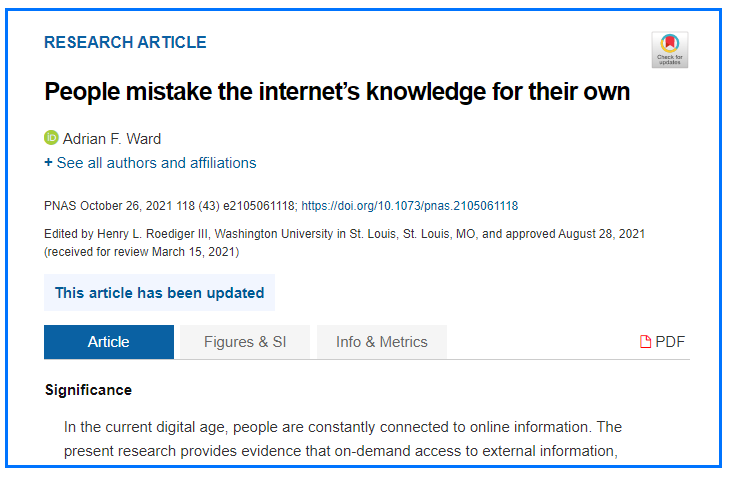Don’t mistake the internet’s intelligence for your own
How often does it happen to you that you thought you understood something well, but then once you have to explain it you realise that you didn’t really understand it that well after all?
This happened to me after watching this documentary about black holes. The documentary explains that Stephen Hawking came up with a paradox that shows that black holes can effectively “destroy information” (also called the Black Hole Information Paradox). This is a big no-no in physics.

Anyway, the point is that I felt super confident about my layman’s understanding of this theory while watching, but a couple of days later a co-worker asked me about it and I had trouble explaining exactly how it worked.
According to Professor Barbara Oakley, creator of the Learning How To Learn MOOC, this is called the illusion of competence: the feeling that you understand the material while actually lacking a thorough understanding.
She encountered this illusion of competence with her students that were trying to learn math. She explains that this is why following along a math solution is different than actually solving it:
If you just look at the solution, for example, then tell yourself. Oh yeah, I see why they did that. Then the solution is not really yours. You’ve done almost nothing to knit those concepts into your own underlying neural circuitry. Merely glancing at a solution and thinking you truly know it yourself is one of the most common illusions of competence in learning.
She goes on further and also reasons that this is the reason why highlighting and rereading are ineffective study methods:
The reason students like to keep rereading their notes or a textbook, is that when they have the book or Google open right in front of them, it provides the illusion that the material is also in their brains. But it’s not, because it can be easier to look at the book instead of recalling, students persist in their illusions studying in a way that just isn’t very effective.
But this is about studying math and not about writing better code or becoming a better engineer! Well that’s right, but we just fall prey to the same illusion in a slightly different way.
People mistake the internet’s knowledge for their own
Take a look at this paper: People mistake the internet’s knowledge for their own.

In the current digital age, people are constantly connected to online information. The present research provides evidence that on-demand access to external information, enabled by the internet and search engines like Google, blurs the boundaries between internal and external knowledge, causing people to believe they could—or did—remember what they actually just found.
All this on-demand access to external information like Google and StackOverflow blurs the boundaries of what we consider to be “our” knowledge.
Using Google to answer general knowledge questions artificially inflates peoples’ confidence in their own ability to remember and process information and leads to erroneously optimistic predictions regarding how much they will know without the internet. When information is at our fingertips, we may mistakenly believe that it originated from inside our heads.
I believe that this result is especially important for people that rely heavily on these types of external information do their jobs: software engineers, machine learning engineers, data scientists, etc. There is no doubt that we have all become much more productive thanks to these external information sources, but we have also come to very much rely on them.
All I’m asking is that you keep on Googling and StackOverflowing, but are careful not to fall prey to the illusion of competence and mistake the internet’s intelligence for your own.





Comments